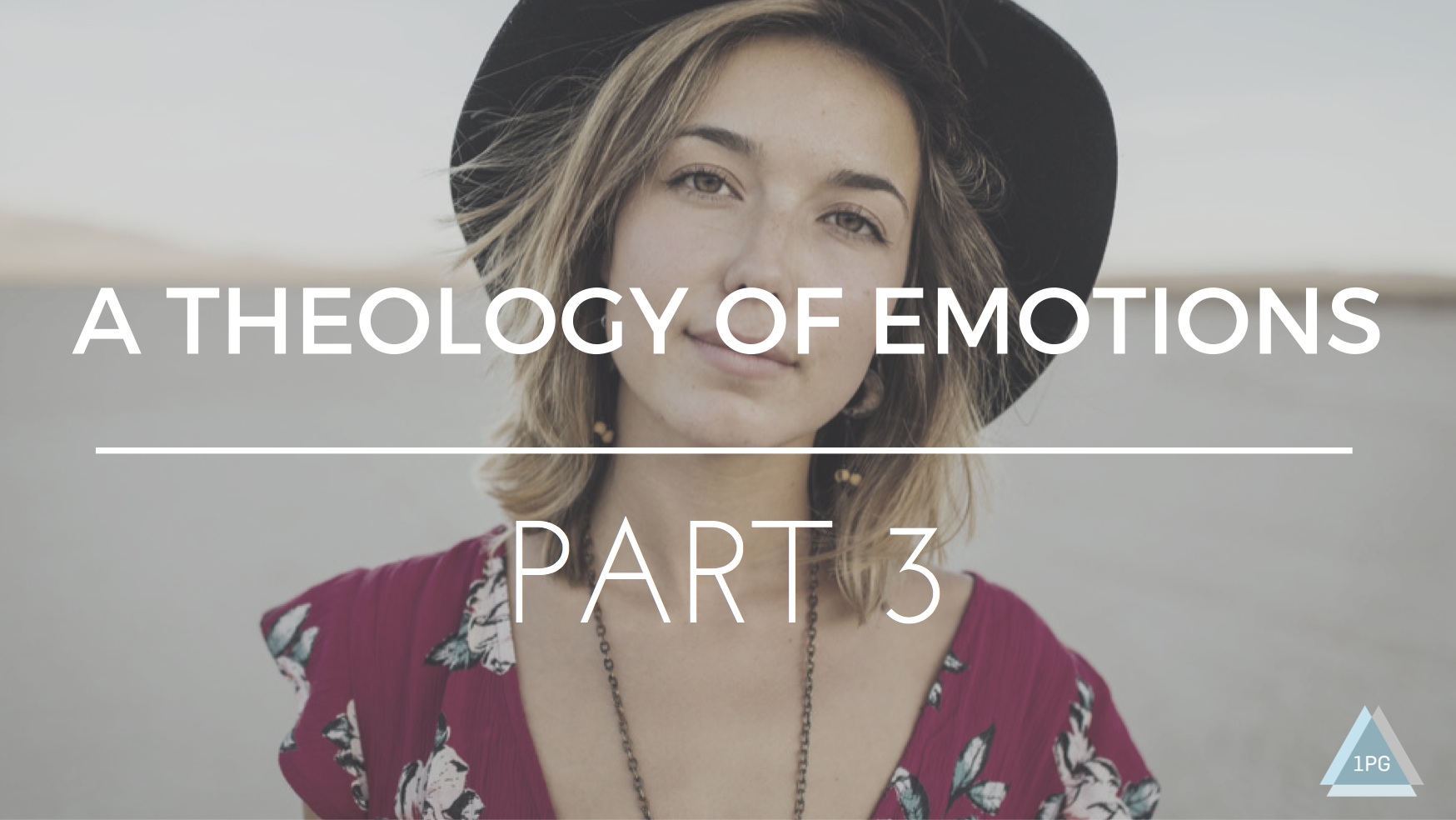A Theology of Emotions, Part 3

"What you resist not only persists, but will grow in size." -C.G. Jung-
Last month I began to explore why we have emotions by looking at how Jesus used his emotions as a gauge. Jesus used them as a gauge for how close he was to the Father - anger/sadness at the brokenness of the world and being further away from God...joy, compassion in the moments of redemption and being close to God.
I suggest we continue to consider how our emotions serve as a gauge in understanding ourselves, others, and the world around us, even though we are woefully broken.
One of the more common complaints I hear from Christians is how much our emotions are tainted by sin so we cannot, or should not, trust them.
I get where this comes from, and theologically there is truth to it. As Paul writes in 2 Corinthians 10:5 we are to “...take captive every thought to make it obedient to Christ.” Our thoughts cannot have the final say because they wander, they are filled with brokenness - we have to actively take captive what we are thinking...this is not passive!
You could similarly insert “emotions” or “feelings” for thoughts in 2 Corinthians 10:5. But again, and I’m going to sound like a broken record on this, before we get to how we should take our emotions/feelings captive...we have to understand what they are telling us. We so quickly run to taking them captive that when they continue showing up, we are left confused and unprepared to deal with their force and weight.
What Our Emotions Show Us Our emotions serve as a gauge to where we are with God, others, and ourselves. I mentioned some of this in my first post on the Theology of Emotions, but I’m going to revisit it and unpack it a little more.
When we feel something, it is often uniquely tied to an experience, memory, belief, or part of our story. We would all agree there are “universal” emotions in that when you talk about anger everyone knows what that means. But what happens inside your heart/head/body when you feel anger says more about where you have been than the “universality” of anger.
By way of example...let’s say I grew up with highly critical parents who were always expressing to me their displeasure at my life choices (whether good or bad). No matter what I say or do, they are consistently telling me it is “not good enough.” As a child, this will have some bearing on how I interact with the world (how I see myself, others, and God).
I could view God as never being pleased with me - no matter how much I ask for forgiveness I have to work harder to gain his pleasure. I could view others as always being disappointed with me - I have to do more for them so they will like me. I will likely not have a very high view of myself - always finding the worst parts about me to highlight.
A common response I may have with life, as a follower of Christ, is to operate with some mode of low-level guilt beneath the surface. And when I experience any emotions - this guilt will dictate how I interpret them.
My wife comes in the kitchen, tells me I forgot to wash the dishes like I said I would. This is a normal occurrence but it is going to hit me in a different way considering my story. It plays into something that is already deeply hurtful to me - I was never good enough and am constantly at war with how terrible I am. I may feel an emotion like sadness or anger and what I might tell myself is any of the following: -“You shouldn’t get angry with her, she’s right, you let her down and just like you let everyone else down” -“Who does she think she is? I’m constantly showing her how good I am and she notices this ONE thing I didn’t do?”
In each thought, I am experiencing the emotion and immediately jumping to “taking it captive” which looks more like shaming myself (or encouraging myself) for having it. I don’t want to feel the emotion so I try to push it away or indulge it to it’s maximum.
But what if I took the time to understand what my emotion is helping me gauge relationally? Instead of trying my best to hide the emotion, or shame myself into not feeling it - what if I asked “What is this emotion showing me as a gauge?”
The Gauge from Our Story In my example above, it points back to the pattern and history of not ever feeling good enough, which leads me to react by further shaming myself OR digging my feet in and trying to prove myself worthy - either way I’m not really responding to the present situation. I am responding to pain and hurt from my past...I may be responding to some present pain (maybe my wife was super mean to me before mentioning the dishes…) Either way, I don’t take the time to ask “What is the emotion showing in my relational gauges?”
Without proper acknowledgement of the emotion - (“I feel hurt right now”) I cannot get to the underlying root of the problem (“I think I am inadequate.”) This erodes the relationship with my wife anytime she hits on the open wound of thinking I am inadequate all the time (which is going to happen more than she, or I, realize if I am constantly pushing away the emotion I feel after it happens). It probably will destroy some intimacy with friends close to me because I am going to work really hard to try and earn their love. It is definitely going to get in the way of connecting with Christ’s grace for me, thinking I have to work hard to earn it from Him too.
All of this from a comment about not washing the dishes?! It might be a big jump but it illustrates what happens when we fail to acknowledge we feel certain emotions. How often do you start out describing a feeling with a qualifier? -”I’m mad BUT I don’t really have any reason to be…” -”I’m really sad, BUT I will be ok…” -”I feel good about it BUT it’s not that big of a deal…”
Any of these statements might carry a decent amount of truth - you really might be ok even though you are sad...but what we miss when we fail to allow our emotions to exist first is the opportunity to explore where they come from and why we are experiencing them. Without this, the emotion will show up again and again, and we go through the dance of trying to hide it, or get rid of it for fear of what it might say about us.
The trouble with this, as mentioned in previous posts, is that in spite of our best efforts to rid ourselves of it...that the emotion is still there. It doesn’t matter how many times I tell myself I have no reason to be mad about something...I’m still going to be mad about it if I’m really being honest with myself. The anger may be smaller...or it may only exist beneath the surface where nobody else can see it...but after holding this down for so long, acting like it should not/cannot be there - it will eventually burst through, completely out of my control.
So what does it look like to allow our emotions to exist first? We have to first acknowledge that the emotion exists. This sounds so simple it is almost insulting but we have lost the ability to do this in our culture and it is going to take focused effort to do it. Next time you are angry, no matter how small the event is that caused it, acknowledge that your anger is there. We will talk more next month about what taking this feeling captive looks like, but I want you to get used to the practice of identifying the emotion and acknowledging its existence first.
Further practice by asking yourself: What is this emotion showing me in my gauges? What is this emotion revealing about how I see myself? Others? God? Where am I in relationship to all of these?
The point is not to necessarily trace back each feeling to a single moment in your childhood...but to begin understanding your emotions and feelings within the context of your unique story.
Next month we will begin to explore what to do with these emotions in light of our brokenness and sin.
